This site is supported by our readers. We may earn a commission, at no cost to you, if you purchase through links.

Vet-recommended options like PetArmor 7 Way De-Wormer and Panacur C target common parasites such as roundworms, hookworms, and tapeworms.
For small dogs, Durvet Triple Wormer is a reliable choice, while larger breeds might benefit from Safe-Guard Canine Dewormer.
If you prefer a natural approach, herbal cleanses are gaining popularity too.
Always match the dewormer to your dog’s age, size, and health, and remember a happy pup is a result of regular check-ups to keep those parasites at bay!
Table Of Contents
- Key Takeaways
- Dog Deworming Importance
- Signs of Worm Infestation
- Choosing Dog Dewormers
- Dewormer Administration
- Top 9 Best Dog Dewormers
- 1. PetArmor 7 Way De-Wormer for Small Dogs
- 2. Durvet Triple Wormer for Dogs
- 3. Panacur C Canine Dewormer 4 Gram 3 Count
- 4. 8 in 1 Dog Dewormer
- 5. Elanco Dog Tapeworm Dewormer Tablets
- 6. Nemex 2 Wormer for Dogs
- 7. Pyrantel Pamoate Dog Dewormer Suspension
- 8. Excel 8in1 Safe Guard Canine Dewormer Large Dog
- 9. Herbal Cleanse for Pets Homeopathic Support
- Preventing Re-Infection
- Dog Health Maintenance
- Frequently Asked Questions (FAQs)
- What is the best dewormer for puppies?
- What are the symptoms of worms in dogs?
- Are dog dewormers effective against parasites?
- Is Bayer a good dewormer for dogs?
- Is 8 in 1 a good dog dewormer?
- What is the best Wormer for dogs?
- What is the best dog dewormer in 2024?
- What is the best Wormer for a dog?
- What is the best dog dewormer for heartworms?
- Do dewormers kill worms in dogs?
- Conclusion
Key Takeaways
- Keep your dog worm-free with vet-recommended options like PetArmor 7 Way De-Wormer or Panacur C, tailored to their size and health needs.
- Watch for symptoms like weight loss, bloating, or appetite changes, and act fast with the right dewormer to prevent serious health issues.
- Regular check-ups, fecal exams, and hygiene practices are crucial for early detection and preventing re-infection.
- Use year-round parasite prevention, including flea control and heartworm medication, to protect your dog and family from harmful parasites.
Dog Deworming Importance
Keeping your dog worm-free isn’t just about their comfort—it’s essential for their health.
Regular deworming keeps your dog healthy, happy, and protects your family from harmful parasites. Prevention is the best cure!
Intestinal parasites can cause serious issues for pets and even spread to humans, so regular deworming is a must.
Intestinal Parasites in Dogs
Intestinal parasites in dogs are more common than you’d think, with regional prevalence varying widely.
These pests thrive due to environmental contamination and complex worm lifecycles.
To protect your pup and family:
- Stick to a canine deworming schedule.
- Use a dog dewormer suited to your pet’s needs.
- Address zoonotic potential by maintaining strict hygiene.
Don’t let worms win, and remember to follow these steps to prevent intestinal parasites.
Common Types of Worms
Dogs face various types of worms, each causing unique issues.
Roundworm symptoms include a pot-bellied look and growth issues in puppies.
Hookworm anemia can leave dogs weak, while whipworm diarrhea often leads to weight loss.
Tapeworm transmission happens through fleas, leaving rice-like segments in stool.
Heartworm prevention is essential since these parasites attack the heart.
Quick treatment keeps your pup thriving!
Zoonotic Risks to Humans
Through human transmission, dog parasites like roundworms and hookworms pose serious zoonotic diseases.
Dog parasites like roundworms and hookworms can spread to humans, causing serious health risks—protect your family with regular deworming and hygiene.
Kids are especially vulnerable due to environmental contamination from pet waste.
Worm infections can cause vision loss or organ damage in humans.
Preventative measures—like cleaning up after dogs, washing hands, and regular deworming—boost public awareness and reduce pet health risks, keeping everyone safer.
Signs of Worm Infestation
Spotting the signs of a worm infestation in your dog can save them from discomfort and serious health issues.
Keep an eye out for symptoms like weight loss, bloating, or changes in appetite—they’re not just quirks, they could mean trouble.
Changes in Appetite
A worm infestation can turn your dog’s appetite upside down.
Whether it’s increased hunger, decreased appetite, or sudden changes like selective eating, these shifts shouldn’t be ignored.
Worms steal nutrients, leaving your pup hungry yet losing weight.
Watch for food aversion or picky eating—these are common dog worm symptoms requiring prompt dog deworming.
- Sudden appetite changes
- Selective or picky eating
- Increased hunger without weight gain
- Food aversion or refusal
Weight Loss and Diarrhea
Weight loss paired with diarrhea can signal dog worm symptoms that shouldn’t be ignored.
Worms disrupt digestion, causing malabsorption issues and rapid weight loss despite normal eating.
Bloody or mucus-covered diarrhea worsens gastrointestinal issues, leading to dehydration and secondary infections.
Always assess severity and guarantee hydration.
A reliable dog dewormer tackles these symptoms, restoring balance.
| Symptom | Cause | Impact on Dog |
|---|---|---|
| Weight Loss | Malabsorption | Rapid weight drop |
| Bloody Diarrhea | Intestinal Damage | Dehydration risk |
| Mucus in Stool | Inflammation | Discomfort |
| Lethargy | Nutrient Loss | Reduced energy |
| Secondary Infections | Prolonged Symptoms | Health complications |
Nausea and Coughing
Vomiting and coughing can be telltale signs of worm infestations. You might notice visible worms in vomit or hear persistent coughing, especially with heartworms.
Common causes include gastrointestinal issues or dewormer reactions. Watch for these symptoms:
- Vomiting with visible worms.
- Dry or persistent coughing types.
- Nausea causes appetite loss.
- Fatigue after coughing fits.
- Seek veterinary advice for symptom relief.
Regular fecal exams aid in early detection. This is crucial for identifying and treating worm-related issues.
Low Energy and Bloating
Low energy and bloating often point to worm infections in dogs.
A pot-bellied look, especially in puppies, signals intestinal parasites like roundworms.
Lethargy might stem from blood loss or discomfort.
Keep an eye on dietary changes and hydration levels, as these can worsen symptoms.
A broad spectrum dewormer offers effective dog worm treatment, restoring liveliness and reducing bloating.
Choosing Dog Dewormers
Choosing the right dewormer for your dog means focusing on their specific needs, like age, health, and the type of worm.
It’s not one-size-fits-all, but with the right information, you’ll keep your pup healthy and parasite-free.
Identify The Type of Worm
How can you tackle worms without knowing the enemy? Identifying the type of dog worms is key.
Start with a veterinarian diagnosis using fecal exams or microscopic analysis. Look for visual signs like rice-like tapeworm segments or pot-bellied roundworm symptoms.
It’s important to know that puppies can get worms from their mothers.
Accurate identification guarantees effective tapeworm treatment, hookworm treatment, roundworm treatment, or whipworm treatment for your furry friend.
Consider Dog’s Age and Health
When choosing a safe dog dewormer, think about your pup’s age and health.
Puppy deworming often requires gentler formulas, while senior dogs or breeds with predispositions may need specialized care.
Underlying conditions and medication interactions also play a role.
Always consult your vet to verify the prescription dog dewormer fits your dog’s needs, keeping their health in check with specialized care.
Active Ingredients and Forms
When picking a dog dewormer, understanding active ingredients makes all the difference.
Broad-spectrum efficacy guarantees multiple parasites are tackled at once.
Here’s a quick breakdown:
- Ivermectin: Heartworm prevention and hookworm control.
- Fenbendazole: Safe for roundworms, whipworms, and giardia.
- Praziquantel: Targets tapeworms.
- Pyrantel pamoate: Effective against roundworms.
- Dewormer types: Tablets, liquids, and topicals suit different needs.
Many owners buy deworming products online for convenience.
Dewormer Administration
Giving your dog a dewormer might seem tricky, but it’s simpler than you think with the right approach.
Proper dosage and technique guarantee the medication works effectively while keeping your pup comfortable.
Proper Dosage and Techniques
Getting the dosage right is key to effective dog parasite treatment. Weigh your dog to calculate the proper amount and follow dosing instructions carefully.
Administering pills can be tricky—hide them in treats! For liquid dosage, use a syringe behind a canine tooth.
Puppies need special attention; their dosages differ. Remember that regular vet checkups are essential for prevention.
Consult your vet for injection techniques or tricky cases.
Potential Side Effects and Management
Dewormer side effects like vomiting or diarrhea affect about 1% of dogs but are usually mild.
Watch for allergic reactions or unusual behavior after pet deworming.
If symptoms persist, seek veterinary advice for dosage adjustments or supportive care.
Some pet owners seek products for this issue to help manage these effects.
Avoid re-dosing unless advised, as this can lead to further complications.
Long-term effects are rare, but your dog’s health improves with proper dewormer use and monitoring.
Top 9 Best Dog Dewormers
Finding the right dewormer for your dog can feel overwhelming, but it doesn’t have to be. Here are nine top-rated options to keep your pup healthy and worm-free.
1. PetArmor 7 Way De-Wormer for Small Dogs
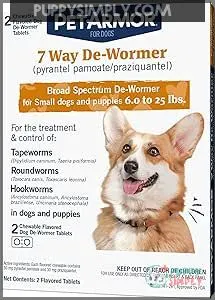
PetArmor 7 Way De-Wormer for Small Dogs is like a safety net for your pup’s health.
It tackles seven worm types, including tapeworms, roundworms, and hookworms, with active ingredients pyrantel pamoate and praziquantel.
The beef-flavored chewables make dosing easy—just hand it over or hide it in a treat.
Designed for dogs 6 to 25 pounds, it’s safe for puppies 12 weeks or older.
Side effects like mild diarrhea are rare, but always consult your vet for personalized advice.
Best For: Puppies and small dogs between 6 to 25 lbs who need protection against tapeworms, roundworms, and hookworms.
- Potential for mild side effects like diarrhea or vomiting.
- Not suitable as heartworm prevention.
- Requires veterinarian consultation for sick or pregnant dogs.
- Treats and controls 7 species of worms effectively.
- Easy-to-administer beef-flavored chewable tablets.
- Cost-effective option compared to vet treatments.
2. Durvet Triple Wormer for Dogs
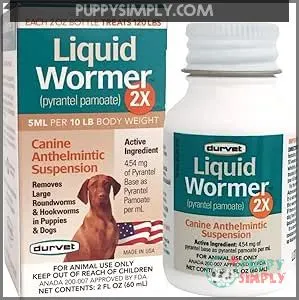
Sometimes, finding the right dewormer feels like searching for a needle in a haystack, but Durvet Triple Wormer makes it easy.
This chewable tablet tackles roundworms, hookworms, and tapeworms effectively, making it a reliable choice for dogs over six pounds.
Its palatable flavor guarantees even picky pups won’t put up a fight.
With active ingredients like pyrantel pamoate and praziquantel, it provides broad-spectrum protection.
Just consult your vet for proper dosage, and you’re set to keep your furry friend worm-free and happy with proper care.
Best For: Dog owners seeking an easy-to-administer, broad-spectrum dewormer for pets over 6 pounds.
- Requires a vet consultation for proper dosage.
- Possible side effects like vomiting or loose stools.
- Dosage varies, which may require precision and careful administration.
- Effective against roundworms, hookworms, and tapeworms.
- Palatable taste that dogs accept readily.
- Convenient chewable tablet form.
3. Panacur C Canine Dewormer 4 Gram 3 Count
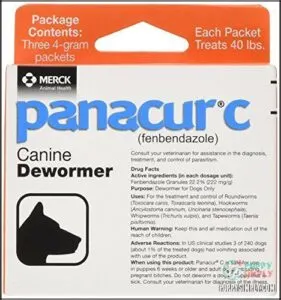
Why settle for less when Panacur C Canine Dewormer offers reliable, vet-approved parasite protection?
This FDA-approved treatment uses fenbendazole to tackle roundworms, hookworms, whipworms, and Taenia tapeworms.
Safe for puppies as young as six weeks and even pregnant dogs, it’s a versatile choice, with minimal side effects.
Just mix the granules with your dog’s food for three days—it’s that simple, making it a trusted option for keeping your pup happy, healthy, and worm-free.
Best For: Dog owners looking for a reliable, easy-to-use dewormer for puppies, adult, and pregnant dogs.
- Effectively treats roundworms, hookworms, whipworms, and Taenia tapeworms.
- Easy-to-administer granules mix with food for convenience.
- Safe for puppies 6 weeks and older, including pregnant dogs.
- Does not treat all tapeworm species.
- Approximately 1% of dogs may experience vomiting as a side effect.
- Packaging produces more waste compared to loose form options.
4. 8 in 1 Dog Dewormer
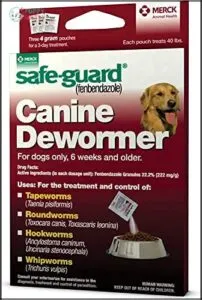
In the matter of keeping your dog worm-free, the 8 in 1 Dog Dewormer is a reliable choice.
It effectively removes roundworms, and its liquid form makes dosing simple, thanks to the included cup.
Dogs love the flavor, so no battles at mealtime!
However, it’s not suitable for pregnant or breeding dogs, and side effects like vomiting or loose stools may occur.
Always consult your vet for guidance.
Affordable and easy to use, this dewormer is perfect for routine parasite protection.
Best For: Pet owners looking for an affordable roundworm dewormer that is easy to administer in liquid form.
- Not suitable for pregnant or breeding dogs.
- Side effects like vomiting or loose stools may occur.
- Requires consultation with a vet for proper diagnosis and usage.
- Effectively removes roundworms.
- Convenient liquid form with a dosage cup included.
- Dogs enjoy the flavor, ensuring easy administration.
5. Elanco Dog Tapeworm Dewormer Tablets
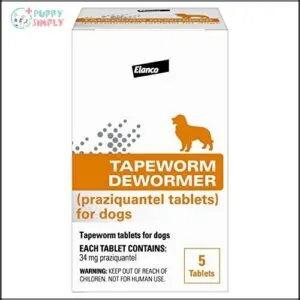
Elanco Dog Tapeworm Dewormer Tablets are a lifesaver if your pup’s battling tapeworms.
Packed with 34mg of praziquantel per tablet, they target Dipylidium caninum and Taenia pisiformis effectively.
These tablets work fast—results often show within hours—and can be given directly or mixed with food.
They’re safe for dogs over four weeks old, but don’t skip flea control to avoid reinfection.
Affordable and easy to use, they’re a smart alternative to pricey vet treatments, keeping your dog healthy and parasite-free.
Best For: Pet owners seeking a fast, affordable, and effective solution for treating tapeworm infestations in dogs over 4 weeks old.
- Rapid results, often visible within hours.
- Safe and easy to administer directly or with food.
- Cost-effective compared to vet-prescribed treatments.
- Requires diligent flea control to prevent reinfection.
- Potential for mild side effects like loose stool or lethargy.
- May need a follow-up dose to ensure complete removal.
6. Nemex 2 Wormer for Dogs
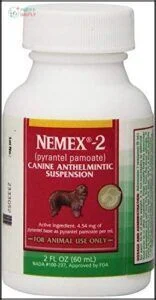
Nemex 2 Wormer is a lifesaver for young puppies and dogs battling roundworms and hookworms.
Its liquid formula, packed with pyrantel pamoate, is easy to administer—just mix it with food or use directly.
Perfect for puppies as young as two weeks, it’s gentle yet effective, with visible results in 12 hours.
Treat your lactating dog two weeks post-birth to prevent reinfestation.
Affordable and caramel-flavored, it’s a hit with pets.
Just follow dosing instructions carefully for safe, worm-free results!
Regular checkups can help with future worm prevention.
Best For: Puppies as young as two weeks old and adult dogs needing treatment for roundworms and hookworms.
- Easy-to-administer caramel-flavored liquid formula.
- Effective with results visible within 12 hours.
- Gentle yet powerful treatment for young and lactating dogs.
- Not suitable for puppies under two weeks old.
- Must follow accurate dosing to avoid side effects.
- Potential drug interactions with other medications.
7. Pyrantel Pamoate Dog Dewormer Suspension
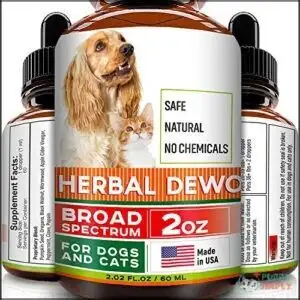
If you’re looking for a straightforward dewormer, Pyrantel Pamoate Dog Dewormer Suspension is a solid choice.
It’s easy to use—just add drops to your dog’s food or water daily, with natural ingredients like pumpkin seed and black walnut, it gently supports parasite cleansing while being free of artificial additives.
The liquid formula works for dogs of all ages, even puppies and seniors.
While some users report dropper issues, the 90-day satisfaction guarantee provides peace of mind if it doesn’t meet expectations, making it a reliable option with peace of mind.
Best For: Pet owners looking for a natural, easy-to-use dewormer for dogs of all ages.
- Natural ingredients like pumpkin seed and black walnut.
- Easy-to-administer liquid formula suitable for all dog ages.
- 90-day satisfaction guarantee for refunds.
- Dropper issues can affect accurate dosing.
- Mixed reviews on effectiveness for all pets.
- Oregano oil could irritate sensitive pets’ gastrointestinal systems.
8. Excel 8in1 Safe Guard Canine Dewormer Large Dog
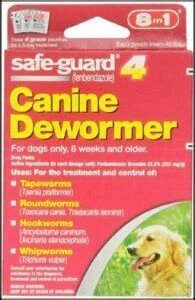
Excel 8in1 Safe Guard Canine Dewormer is a lifesaver for large dogs battling worms.
Packed with fenbendazole, it tackles tapeworms, roundworms, hookworms, and whipworms effectively. The granules mix seamlessly into food, making dosing stress-free.
Safe for puppies over six weeks and even pregnant dogs, it’s versatile and reliable. Administer it for three consecutive days, and you’ll notice improvements quickly.
Plus, it’s cost-effective compared to vet prescriptions. If your dog’s been itching, scooting, or losing weight, this dewormer might just be your best ally!
Best For: Large dogs, puppies over six weeks, and pregnant dogs needing an effective and safe deworming solution.
- Vomiting reported in a small percentage of dogs.
- Requires a consecutive 3-day treatment regimen.
- Often out of stock due to high demand.
- Effectively treats multiple types of worms (tapeworms, roundworms, hookworms, and whipworms).
- Easy to mix granules into food for stress-free administration.
- Cost-effective alternative to veterinary prescriptions.
9. Herbal Cleanse for Pets Homeopathic Support
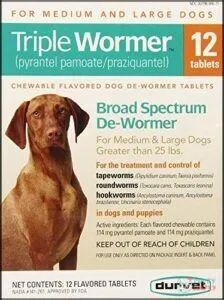
Herbal Cleanse for Pets offers a gentle, homeopathic approach to deworming, ideal for pet owners seeking natural solutions.
Developed by veterinarians, this daily supplement supports digestive health, strengthens the immune system, and helps cleanse your dog’s body.
It’s suitable for dogs over three weeks old and can be added to food or water for easy administration.
While it’s not a traditional dewormer, it’s a great preventative option or complement to other treatments, think of it as a wellness boost for your furry friend!
Best For: Pet owners seeking a gentle, natural supplement to support digestive health and immune function in dogs and cats over 3 weeks old.
- Veterinarian-developed homeopathic formula.
- Easy to administer in food or water.
- Supports digestive health and immune system.
- Not a traditional dewormer for treating parasites.
- Requires daily use for effectiveness.
- May not treat heavy worm infestations directly.
Preventing Re-Infection
Keeping your dog worm-free doesn’t stop at treatment—it’s all about preventing re-infection. Regular check-ups, clean spaces, and good hygiene make a world of difference.
Regular Fecal Examinations and Check-Ups
Regular fecal evaluations guarantee your dog stays worm-free after using a dewormer.
Collecting fecal samples for lab analysis helps detect intestinal parasites early.
Veterinary advice on interpreting test results is key to effective parasite diagnosis.
Experts recommend testing:
- Puppies: Every 3 months
- Adults: Annually
- Dogs with symptoms: Immediately
- Post-treatment: 2-4 weeks later
Stay proactive for your pup’s health and ensure they remain worm-free!
Maintaining a Clean Environment and Hygiene
A clean environment is your first line of defense against worms.
Prompt dog feces disposal and regular yard sanitation keep parasites at bay.
Prioritize food hygiene, water cleanliness, and consistent grooming practices to protect pet safety.
Proper disposal helps with responsible pet ownership.
These habits, paired with a quality dog dewormer, guarantee puppy care stays on track and highlights your pet owner responsibilities.
Prevention beats treatment every time!
Consulting a Veterinarian for Guidance
A veterinarian’s expertise guarantees your dog gets customized deworming and preventative strategies.
Their advice helps with dosage accuracy and follow-up care.
Here’s why consulting them is vital:
- Expert diagnosis for identifying worm types.
- Customized deworming plans for individual needs.
- Preventative strategies to avoid reinfection.
- Dosage accuracy for safe treatments.
- Follow-up care to monitor progress.
Dog Health Maintenance
Keeping your dog healthy means staying ahead of parasites with year-round protection against worms, fleas, and heartworms.
It’s not just about comfort—it’s about preventing serious health risks for both your dog and your family, which is a critical aspect of maintaining their overall health.
Year-Round Parasite Protection
Protecting your dog year-round isn’t just smart—it’s a lifesaver. Consistent deworming with options like NexGard Plus or Interceptor Plus guarantees parasite prevention, while Trifexis adds heartworm prevention to the mix.
Pair this with environmental control and veterinary guidance to reduce zoonotic risks. Dogs with breed predisposition may need customized plans. Stay proactive for their health!
| Dewormer | Targets Parasites | Form | Added Benefits |
|---|---|---|---|
| NexGard Plus | Roundworms, Hookworms | Chewable | Fleas, Heartworm |
| Interceptor Plus | Tapeworms, Whipworms | Tablet | Heartworm Prevention |
| Trifexis | Roundworms, Hookworms | Chewable | Fleas, Heartworm |
| Panacur C | Whipworms, Tapeworms | Powder | Safe for Puppies |
Flea Prevention and Tapeworm Control
Fleas are more than itchy pests—they’re part of the flea lifecycle that spreads tapeworms to dogs.
Preventative medication like NexGard Plus and tapeworm treatment dogs need, such as Praziquantel, are key.
Combine this with environmental control and hygiene practices to stop tapeworm transmission.
- Use flea control products.
- Treat tapeworms promptly.
- Wash bedding regularly.
- Vacuum frequently.
Heartworm Prevention and Treatment
Heartworm prevention is essential since mosquitoes can disrupt your dog’s health by transmitting these dangerous parasites.
Prevention medication like Heartgard Plus (with ivermectin) stops heartworms before they start.
If heartworm diagnosis confirms infection, treatment protocols involve careful steps to avoid complications.
Post-treatment care guarantees recovery.
Protect your dog year-round—staying ahead of the mosquito lifecycle is the key to heartworm-free living.
Regular testing is essential, as fecal exams detect worm eggs, aiding in early diagnosis.
Frequently Asked Questions (FAQs)
What is the best dewormer for puppies?
For puppies, Safe-Guard (fenbendazole) or Nemex-2 are excellent options.
They’re safe, effective, and easy to administer.
Just follow dosing instructions closely—puppies are tiny but mighty, and proper care keeps them thriving!
What are the symptoms of worms in dogs?
Worms in dogs can cause diarrhea, vomiting, weight loss, a pot-bellied appearance, dull coats, and scooting.
Sometimes, you’ll spot worms in their stool or vomit.
Symptoms vary, so watch for subtle changes in behavior or appetite.
Are dog dewormers effective against parasites?
Think of dewormers as your dog’s secret weapon against parasites.
They’re highly effective, targeting worms like roundworms, hookworms, and tapeworms.
Regular use keeps infestations at bay, ensuring your pup stays healthy and parasite-free.
Is Bayer a good dewormer for dogs?
Bayer dewormers, like Quad Dewormer and Tapeworm Dewormer, are effective and easy to use.
They tackle common parasites like roundworms, hookworms, and tapeworms, offering quick results.
Always follow dosing instructions for your dog’s safety.
Is 8 in 1 a good dog dewormer?
8 in 1 Safe-Guard Dewormer is a solid choice.
It’s broad-spectrum, safe for pregnant dogs, and tackles multiple worm types.
Plus, it’s easy to use and doesn’t interfere with other medications—definitely worth considering!
What is the best Wormer for dogs?
Over 20% of dogs carry intestinal parasites, making prevention essential.
Broad-spectrum options like Interceptor Plus or Safe-Guard tackle multiple worms effectively.
Choose one based on your dog’s age, weight, and specific needs for best results.
What is the best dog dewormer in 2024?
Interceptor Plus stands out for 2024, offering broad-spectrum protection against heartworms, tapeworms, roundworms, hookworms, and whipworms.
It’s easy to administer and vet-recommended, making it a reliable choice for keeping your dog parasite-free year-round.
What is the best Wormer for a dog?
When worms wage war on your pup’s health, Drontal Plus is a top pick.
It’s broad-spectrum, tackling roundworms, hookworms, whipworms, and tapeworms.
Quick results, easy dosing, and vet-recommended—your dog’s health is in good hands!
What is the best dog dewormer for heartworms?
Heartgard Plus is your best bet for heartworm prevention.
It’s easy to give, protects against heartworms, and also tackles hookworms and roundworms.
Monthly dosing keeps your pup safe from these dangerous parasites year-round, making it a great option for year-round protection.
Do dewormers kill worms in dogs?
Yes, dewormers eliminate worms by targeting their specific biology, either paralyzing or killing them.
They work quickly, often within hours, clearing your dog’s system and preventing further harm.
It’s like hitting the reset button, which can be a very relieving and quick solution.
Conclusion
Keeping your dog worm-free is a walk in the park when you’ve got the right tools.
The best dog dewormers in 2025 offer effective solutions for tackling parasites, keeping your furry friend healthy and happy.
Whether you choose vet-recommended options like PetArmor or a natural herbal cleanse, matching the product to your dog’s needs is key.
Don’t forget regular check-ups, a clean environment, and preventive care to stop worms in their tracks.
Your pup deserves it!
- https://parasitesandvectors.biomedcentral.com/articles/10.1186/s13071-020-04147-6
- https://petfolk.com/
- https://www.petsandparasites.org/resources/capc-guidelines
- https://www.fda.gov/animal-veterinary/animal-health-literacy/idea-marketplace-journey-animal-drug-through-approval-process
- https://ordspub.epa.gov/ords/pesticides/f?p=PPLS:1
















